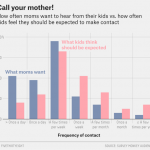I’ll start these quick takes with two call backs to recent topics. Chicago Mag has a post-election interview with Nate Silver.
Back when you were living in Chicago, one of your first blogs was the Burrito Bracket, in which you attempted—via statistics—to find the best burrito in Wicker Park.
Yes. I would just go and eat tacos and burritos for lunch a lot and compare those, get the same food item, like a steak burrito, for consecutive days at different locations. And then try to have quasi-scientific criteria for judging those, just thinking about all the different characteristics for a good burrito or taco.Meat-to-cheese ratio.
Meat-to-cheese ratio. It’s funny. I think it’s always helpful when you’re trying to evaluate something to have a disciplined set of criteria. For a while, I was trying to rate every restaurant that I went to in New York. I would find that I would rate a place four stars and go back a few months later and have a very different view of it. You realize it’s because the food quality can change, but your mood changes so much, where you’ve had a really stressful day at work, and you’re out with a friend who’s in a bad mood, and the service is slow, and the food kind of tastes worse. Whereas, if you’re in a good mood, and you’ve had a couple cocktails, and you’re not feeling stressed, then everything seems wonderful. That exercise taught me that when we go by our gut or our mood—“Oh, our gut will tell us everything we need to know”—believe me, it’s very useful for a lot of things, but it can also fool us.
And, harkening back to Halloween, a comedy group filmed a parody trailer of Magic School Bus as horror movie:
In the free time I will one day have, I quite want to get around to reading Thomas Nagel’s Mind and Cosmos: Why the Materialist Neo-Darwinian Conception of Nature Is Almost Certainly False. The title is provocative, but the reviews make it sound like the material is meatier and more interesting than the aggressive title would suggest. I enjoyed Simon Blackburn’s review of the book for The New Statesman:
According to Nagel, Darwinians can explain, say, why we dislike pain and seek to minimize bringing it about for ourselves and for others we love. But, Nagel thinks, for the Darwinian, its “real badness” can be no part of the explanation of why we are averse to it. So it is another mystery how real badness and other real normative properties enter our minds. Nagel here manifests his founding membership of a peculiar and fortunately local philosophical subculture that thrives by resolutely dismissing the resources of the alternative, Humean picture, which sees our judgement that pain is a bad thing as a useful expression of our natural aversion to it. All he says about this is that it “denies that value judgements can be true in their own right”, which he finds implausible. He is silent about why he thinks this, perhaps wisely, if only because nobody thinks that value judgements are true in their own right…
There is charm to reading a philosopher who confesses to finding things bewildering. But I regret the appearance of this book. It will only bring comfort to creationists and fans of “intelligent design”, who will not be too bothered about the difference between their divine architect and Nagel’s natural providence. It will give ammunition to those triumphalist scientists who pronounce that philosophy is best pensioned off. If there were a philosophical Vatican, the book would be a good candidate for going on to the Index.
But, higher up on my dance card are rereads of The Hobbit, Les Miserables, and Anna Karenina. So, uh, expect thoughts on Nagel next year.
Over at Bad Catholic, Marc Barnes has a nice commentary on what’s wrong with our fascination with a certain class of anti-hero:
We see sin — always destructive — as a solid in an otherwise watery universe. The vandals, arsonists, gangsters, home wreckers, and serial killers; the self-destructive, self-righteous, and self-serving; the womanizers, tyrants, and abusers – we are most of these things, and we think at least one or two of them badass. This is the modern thesis: The man being good is afraid to be bad, and the man being bad is hardcore. The Joker is cooler than Batman. It’s a problem of poetry more than anything else: Goodness is a soft thing, while badness is lauded as hard.
But if we come from Nothing and are going to Nothing, what boldness can there be in destruction? The law of entropy will kill our families, reduce our houses to dust, and slowly, steadily, bring about all the super-hardcore-ness we can imagine. There is no rebellion in hastening the inevitable. A killing spree may shock society, but it is a boredom to the universe, who ultimately kills everyone. To objectify a woman into a sex object might give men a thrill, but it is a pathetic to the universe, who is busy rendering her into a corpse.
Sin is weak. Sin is a white flag of surrender waved to the oncoming Nothingness. Sin chooses absence over being and Nothing over Something. Sin is sinful not in that it is too bold, but in that it is not bold enough.
And Alyssa Rosenberg has some great commentary on whether boys have the right kind of YA heros to look up to.
In much of the classic young adult literature I read as a child, I learned to see myself as boys and men would see me. In The Giver, Lois Lowry’s story of a dystopia, I saw Fiona, a gentle a girl who was blind to the fact that her care for the elderly involved learning to euthanize the oldest among them, and whose ignorance was a source of great pain for Jonas, the novel’s main character. In The Outsiders, Ponyboy’s realization that Cherry Valance’s status as a Soc doesn’t define her as a person guided my interactions with some of the more popular girls who became my friends in middle school and high school…
It’s not a bad thing to learn about yourself from how others see you, as long as that’s not the only opportunity you’re given to examine yourself. In fact, it’s one I think more boys should have. So often, male perspectives in these situations are treated like they’re a default norm, while books with female main characters are assumed to be for girls rather than aimed at and available to everyone.
I’ve always thought that lots of boys of my acquaintance would have loved Tamora Pierce’s novels, which feature heroines who are knights, magicians, or medieval cops, and inevitably involve those characters’ extended meditations on the men who are their mentors, friends, and ultimately lovers. These may be stories about women, but they’re substantially about how different expressions of masculinity serve the men who embody them, and influence the women who come into contact with them.
The essay she’s riffing off of is well worth reading, too.
Eve Tushnet had an excellent piece this week in The American Conservative titled “Hedonist, Disciple or Bourgeois?”
Conservatives often talk as if we’re combating hedonism and the solution is bourgeois normalcy. This makes our arguments look silly (everybody points out that “blue states” have lower divorce and teen pregnancy rates, or some other statistic indicating that they are winning on the bourgeois-normalcy front) and I think it probably makes our audience resentful. Nobody likes to be told that they’re not doing life right, but I think we especially feel indignant and even self-pityingly resentful when we’re working very, very hard to follow the rules and somebody comes along and tells us we’re just out for our own pleasure.
We don’t have a marriage crisis in this country because everybody has stopped following the rules. We have a marriage crisis because the rules don’t work. There are all kinds of strict rules: Don’t marry before you’re “economically stable” (an endlessly-retreating horizon), don’t wait until you’re married to have sex, don’t wait until you’re married to live together, don’t move back in with your parents. And, for the upper classes, don’t have kids too early and don’t have too many. I’ve written about these issues before (hereand here) but I want to emphasize how the rules rely on completely bourgeois impulses to achieve and preserve. They’re based on fear–primarily fear of divorce, but also fear of loneliness–but also on the intense, poignant desire to do the right thing.
If you want to read more of Eve’s thoughts on this topic, she’s doing a series of book reviews for Acculturated themed around ‘the post-nuclear family.’
There’s plenty to look forward to this weekend, and more ways to improve yourself than in the song below, but few are as funny:
Cause its gonna be the future soon
And I won’t always be this way
When the things that make me weak and strange get engineered awayIll probably be some kind of scientist
Building inventions in my space lab in space
Ill end world hunger Ill make dolphins speak
Work through the daytime, spend my nights and weekends
Perfecting my warrior robot race
Building them one laser gun at a time
For more Quick Takes, visit Conversion Diary!












